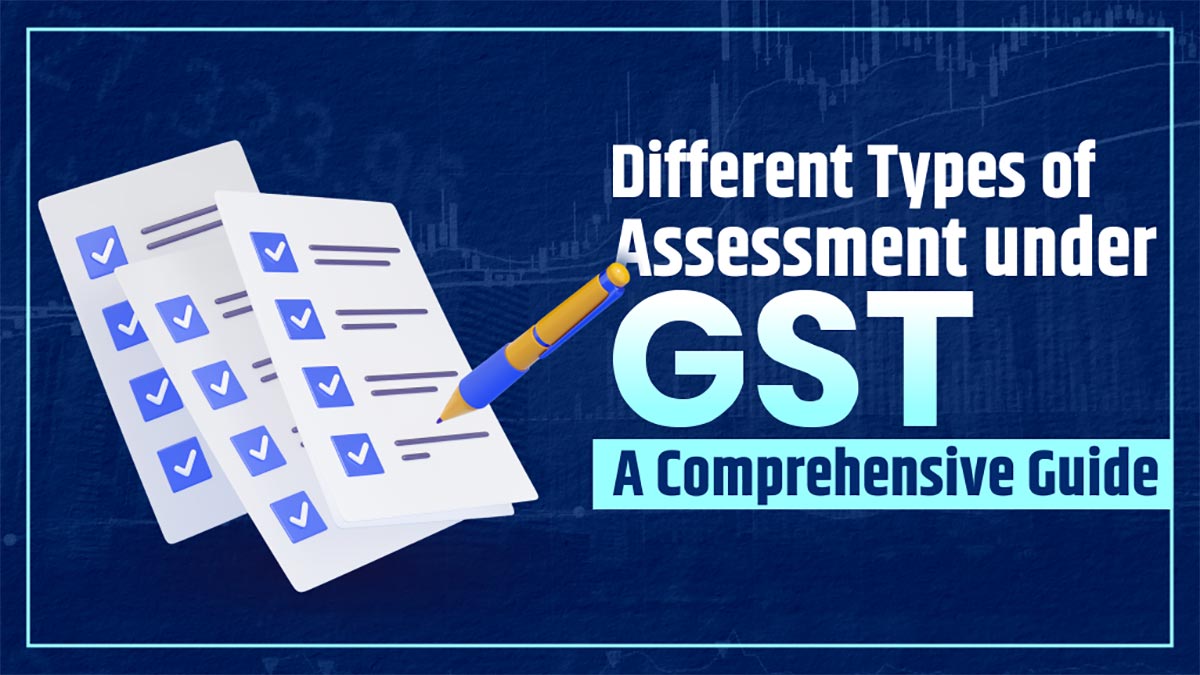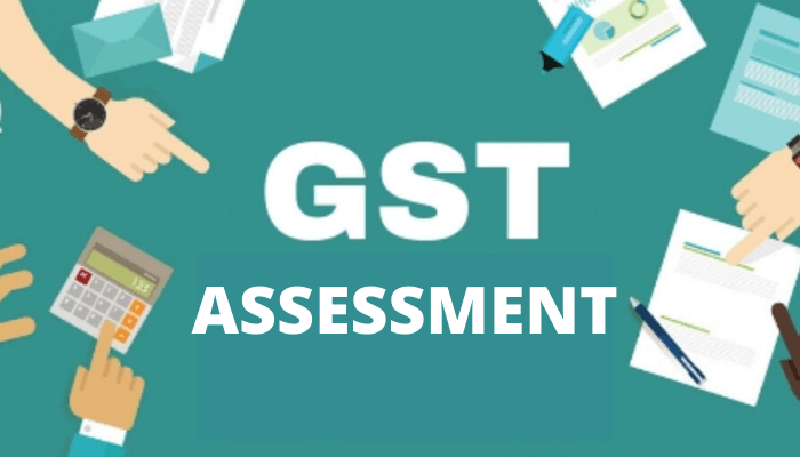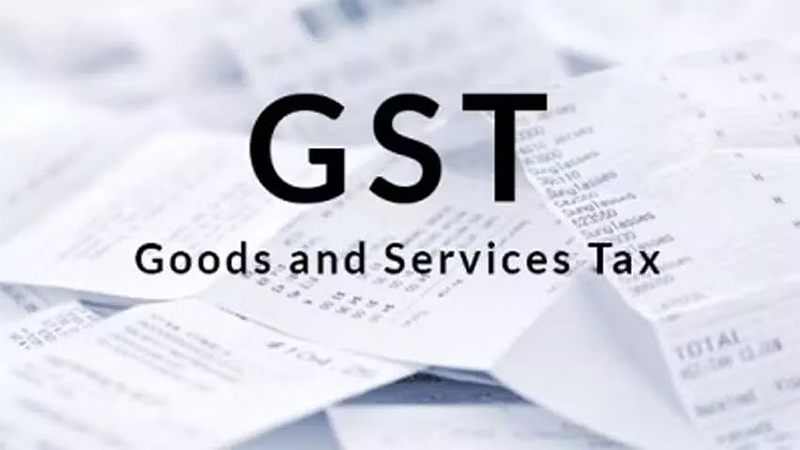
GST assessment is a fundamental process. This allows the tax authorities to scrutinize the tax returns submitted by taxpayers to verify the correctness of their tax liability. The main reason for the assessment is to ensure that taxpayers have computed and paid their taxes precisely. In addition, it serves as a crucial tool to identify any mistakes and inconsistencies in taxpayer returns.
Exploring the Various Types of Assessment under GST
GST Assessment is a vital aspect of tax compliance in India. The following are the six types of GST assessments under the following section
- Section 59 – Self-assessment
- Section 60 – Provisional assessment
- Section 61 – Scrutiny of returns filed by registered taxpayers
- Section 62 – Assessment of registered taxpayer who has failed to file returns
- Section 63 – Unregistered person assessment.
- Section 64 – Summary assessment
1. Self-Assessment
This is the initial level of assessment. Under this section, taxpayers calculate and pay their tax liability. Then, they can file monthly, quarterly, or yearly returns, depending on their turnover.
2. Provisional Assessment
Under GST law, the provisional assessment can only be used in two specific circumstances or situations.
- When a registered taxpayer cannot ascertain the supply value.
- Where taxpayers need help determining the tax rate.
It is important to note that a registered taxpayer cannot apply for Provisional assessment for any other purpose under this section.
The competent authority shall issue an order authorizing tax payment on a provisional basis at a rate or value it determines. This process is usually completed in ninety days after receiving the request for provisional assessment. The final assessment order must be issued within six months after the provisional assessment order is sent.
3. Scrutiny assessment
Under section 61 of the GST, scrutiny assessment is conducted by tax authorities to verify the authenticity of the returns filed by registered taxpayers. The feature of scrutiny assessment is as follows:
- This type of assessment cannot be applied to unregistered persons.
- The tax authorities can only issue a notice under Section 61 if a registered person has filed a return.
- Department generally cannot request the taxpayer to provide additional information or documentation. Only in rare situations can department seek some information.
- This assessment is to be done basis the information which is already with the department from the returns and other forms filed by the taxpayer.
Based on the existing data, the tax authorities may issue a notice determining the final amount of tax to be paid by the taxpayer in form ASMT 10.

4. Best Judgment Assessment
The Best Judgment Assessment is a process invoked when the taxpayer does not provide a return under Section 39 or Section 45 despite receiving a notice under Section 46. The competent office is authorized to appraise the taxpayer’s tax liability by considering all available or procured material and issuing an assessment order within five years from the date specified under Section 44 for submitting the annual return for the pertinent financial year.
5. Assessment of Unregistered Persons
The assessment of unregistered individuals is the procedure where a taxable person who is responsible for getting registration but does not or has had their registration revoked under sub-section (2) of Section 29 but was liable to pay taxes can have their tax liability assessed by the competent officer to the best of their judgment for the corresponding tax periods.
The order for assessment will be given or provided within five years from the date stated under Section 44 for delivering the yearly return for the financial year to which the unpaid tax relates. However, before passing any such assessment directive, the person concerned must be allowed to be heard.
6. Summary Assessment
This type of GST assessment is reserved for specific cases (exceptional cases) where the tax authorities suspect that a taxpayer is attempting to dodge taxes. In such cases
- The competent officer must have evidence indicating that tax is due but remains unpaid.
- Prior consent must be obtained from both the Additional and Joint Commissions.
- Any delay in assessment is believed to be detrimental to the revenue’s interests.
- If the liable taxpayer is unidentifiable, the responsibility for such liabilities will be placed on the person in charge of the relevant goods.
Summary assessment is commonly employed in instances where the taxpayer is either defaulting or cannot be tracked. The time limit for passing orders is not specified. The said section does not explicitly require that the concerned person be allowed to be heard.

Process for Assessment under Goods and Services Tax
The Goods and Services Tax (GST) Act outlines the following formal procedure for assessment:
1. Notice Issuance:
Taxpayers may be required to provide supplementary information as proof of their returns. The issued notice must contain the reason for the assessment, the assessment period, and the required information or papers.
2. Audit Conduct:
The tax representatives can conduct an onsite audit to validate the legitimacy of the taxpayer’s returns. Taxpayers must provide all the required documents and information to the auditors.
3. Assessment Order Issuance:
The authorities can issue an assessment issue order. This notice is based on the information received through the audit notice that specifies the final tax liability. Such assessment orders can also include fines, penalties, or other interest.
4. Rectification Request:
When the taxpayer receives an order and disagrees with it, they can request rectification or errors within thirty days of such notice. If applicable, the tax authorities will review the request and issue a revised assessment.
5. Appeal Filing:
Taxpayers can file for an appeal if they are unsatisfied with the revised assessment order. They can approach the appellate authority for GST matters within thirty days of receiving the order. A final decision will be reached after the appellate authorities examine the case.
Significance of Assessment under GST
The significance of assessment within the framework of GST cannot be overstated due to the following reasons:
- The GST assessment guarantees compliance with the laws of GST for seamless business operation and preventing tax evasion. In addition, this allows the government to collect the right and accurate tax revenue.
- With GST assessment, identifying any mistakes or inconsistencies becomes easy. This help prevents revenue losses that arise from such errors and evasion.
- Assessment under GST also helps educate taxpayers on the proper procedures and processes for calculating and paying taxes. This increases GST compliance, thus, reducing the incidence of errors in returns filed.

Common Errors to Check When Filing Your Taxes
Taxpayers should thoroughly understand the common errors when filing their taxes to avoid being charged with penalties and interests—some common mistakes to avoid when filing GST returns are listed below.
1. Inaccurate assessments of goods and services
Inaccurate assessments may arise due to the wrong classification of goods and services, given that GST rates depend on their type. Therefore, taxpayers must confirm that their goods and services are appropriately classified to avoid such errors.
2. Accurate calculation of tax liability is crucial.
A correct calculation based on GST rates applicable to goods or services can lead to incorrect assessment and penalties. Therefore, taxpayers should ensure that they calculate their tax liability precisely.
3. Delayed Filing
Taxpayers should file their GST returns on time to avoid penalties and interest. However, filing returns after the due date can result in additional charges, so taxpayers must ensure that they file their returns by the deadline.
4. Failure to inform input tax credit
Taxpayers can claim the input tax credit on their purchases to lessen tax liability. However, not reporting it can lead to inaccurate assessments and penalties. To avoid such errors, taxpayers must accurately report their input tax credit.
5. Inaccurate Turnover
Reporting turnover is essential to avoid flawed assessments, and taxpayers should ensure their turnover is correctly written.
Properly maintaining records of transactions and complying with GST laws and regulations is crucial for taxpayers. By doing so, they can ensure the accuracy of their assessments and prevent any legal or financial issues from arising.
Final Note
The GST assessment process is vital to ensure taxpayers comply with the GST laws and regulations. It is crucial that taxpayers accurately calculate and pay their taxes to avoid unnecessary penalties or fines. The types of GST assessment, such as self-assessment, provisional and scrutiny assessment, best judgment assessment, evaluation of unregistered individuals, and summary assessment, assist tax authorities in authenticating the correctness of taxpayers’ returns. The assessment process also prevents evasion of taxes and ensures that the government collects tax income appropriately.
